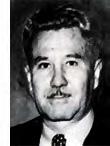阅读马托斯 Luis Pales Matos在诗海的作品!!! | |||
Early years
Matos was born in Guayama, Puerto Rico into a family of well known poets which included both his parents, Vicente Palés Anés and Consuelo Matos Vicil and his brothers and sisters, Vicente, Gustavo, Consuelo and Josefa. His family was instrumental in his poetic development and is refected when at the age of 17 he wrote and published his first book of poetry titled "Azaleas", a collection of his poems. In high school he became the editor of the school's monthly publication "Mehr Licht". His family's financial situation wasn't a good one and he was forced to drop out of high school and earn a living working in various jobs.[1][2]
Diepalismo movement
In 1918, he moved to the town of Fajardo where he worked for El Pueblo, the town's local newspaper. There he met a young lady by the name of Natividad Suliveres and soon married her. Natividad gave birth to a baby boy, but within a year she died. Matos was devastated and expressed his grief in the poem "El palacio en sombras" (The palace in shadows). He moved to San Juan and worked for the daily newspapers, El Mundo and El Imparcial. In San Juan he met and befriended Jose T. de Diego Pardo, a fellow poet and together they created a literary movement known as "Diepalismo", a name derived from the combination of their surnames.[1]
Afro-Antillano poems
In 1926, a local newspaper La Democracia published "Pueblo negro" (Black Town), the first known Afro-Antillano poem. This was the beginning of a new genre of Latin-American literature which blended words from the Afro-Caribbean culture into the Spanish verse of Puerto Rico. In 1937, he published "Tun tun de pasa y grifería" (Drumbeats of Kinkiness and Blackness). This collection of poems was highly acclaimed and received an award of recognition from the Puerto Rican Institute of Literature. He gained fame with his literary work but, the experience was bittersweet. Though Matos is considered, together with the Afro-Cuban poet Nicolas Guillen, the father of the "Negrismo" movement, he was also criticized by the black community, who considered it an insult to their race that Matos, a white man, was becoming famous on their account.[3]
Written works
Some of Matos' works are:
El palacio en sombras (The Palace in Shadows)
Pueblo negro (Black Town)
Danza negra (Black Dance)
Canción festiva para ser llorada (A festival song to cry for)
Falsa canción de baquiné (False Song of a funeral for a child)
Largarto verde (Green Lizard)
Tun tun de pasa y grifería (Drumbeats of kinkiness and blackness)
